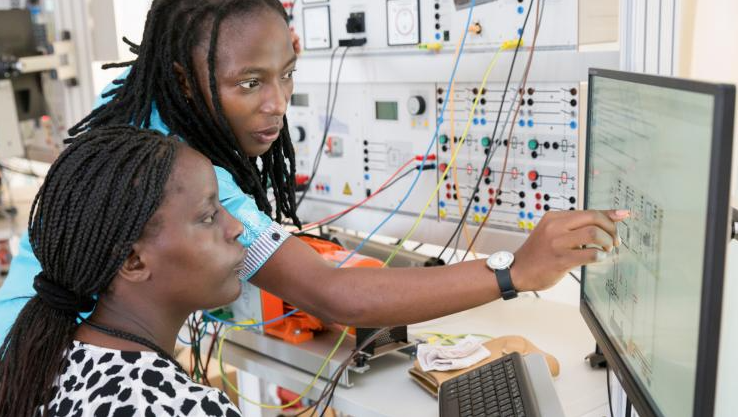Africa’s entry into the digital era has been more than gradual—it has been a leapfrog over decades of missed opportunities. In villages, towns, and bustling cities, mobile phones have evolved from simple communication tools into personal banks, classrooms, doctor’s offices, and marketplaces.
In Nairobi’s Eastlands, Wambui, a young teacher, now runs online tutoring sessions from her kitchen table.
“Five years ago, I had to take matatus (minibuses) to meet my students in person. Now, I teach kids in Mombasa, Kisumu, and even outside Kenya—all from my kitchen table,” she said.
Across the continent, internet cafés are giving way to personal devices, banking halls to mobile wallets, and public announcements to WhatsApp broadcasts. The digital awakening isn’t just catching up—it’s rewriting the rules of modern participation.
From Mobile Money to AI: Everyday Innovations
Few revolutions have been as tangible as mobile money. In Kenya, Tanzania, and beyond, services like M-Pesa transformed financial security overnight, enabling instant transactions regardless of location.
Samuel, a shop owner in Dar es Salaam, recalls:
“I used to hide my earnings under a loose tile in the floor. Now, my profits are on my phone, safe from thieves. I can pay suppliers instantly without leaving the shop.”
Artificial intelligence is also gaining ground—Nigerian farmers use AI-powered apps to identify crop diseases, while South African language tools help rural students translate science and math into their mother tongue. These innovations boost productivity, safeguard health, and expand learning opportunities.
The Rise of African Startups and Homegrown Solutions
From Lagos’ Yaba district to Kigali’s innovation city, young African entrepreneurs are crafting solutions deeply rooted in local realities.
In Accra, university graduates are building an app to connect small-scale farmers directly to city markets.
“We’ve seen farmers lose half their harvest because they can’t reach buyers on time,” says Ama, one of the developers. “We’re building this for our mothers, our uncles, our neighbors.”
Unlike many global tech hubs, Africa’s startup culture blends profit motives with social impact, ensuring solutions serve communities as much as they scale businesses.
Bridging the Connectivity Gap
Urban Africa races ahead with fiber-optic cables and 5G rollouts, but rural communities still face significant connectivity challenges.
In northern Uganda, secondary school students walk five kilometers to a solar-powered internet center to download assignments and access educational videos.
“It’s worth every step,” says Joseph, 16. “When you know more, you can dream bigger.”
Governments and private firms are experimenting with solutions like community Wi-Fi hotspots and low-orbit satellites to ensure information and opportunity reach even the remotest villages.
E-Government and Smart Policies
Governments are also embracing digital transformation. Rwanda’s Irembo platform allows citizens to handle services—from tax payments to marriage certificates—online.
A shopkeeper in Kigali explains:
“I used to close my store for a whole day to renew my business license. Now I do it on my phone before breakfast.”
Digital governance builds efficiency, transparency, and public trust, proving that technology can make bureaucracy work for citizens rather than against them.
Agritech Revolution: Feeding the Continent Through Innovation
Agriculture remains Africa’s largest employer, yet it struggles with unpredictable weather, poor infrastructure, and market access.
In Ethiopia, Mekdes receives daily weather alerts and planting tips via her phone.
“Before, we relied on guesswork. Now, I know exactly when to plant and when to harvest.”
From drones mapping farmland in Zambia to platforms connecting farmers to global buyers, agritech is boosting yields, reducing waste, and improving incomes.
EdTech and E-Learning: Building Africa’s Knowledge Economy
The pandemic accelerated the adoption of EdTech. Students shifted to online lessons, radio broadcasts, and mobile learning apps.
In Johannesburg, Lerato, a high school student, continued her studies using a free app.
“I was scared I’d lose a whole year. But every morning, my phone became my classroom.”
EdTech is expanding beyond children, offering working adults upskilling opportunities, rural learners access to specialized courses, and resources tailored for students with disabilities.
Healthcare on Demand: Tech Saving Lives
For many in Africa, hospitals are hours away. Digital health tools are closing that gap.
Dr. Peter, a Nairobi physician, explains:
“They send me photos of rashes, videos of symptoms, and I can advise them immediately. Sometimes, minutes matter.”
Mobile apps now allow patients to book appointments, order prescriptions, and track chronic illnesses—reducing the need for costly and time-consuming travel.
Challenges Ahead: Infrastructure, Costs, and Cybersecurity
Power outages, high data costs, and cybersecurity threats remain significant hurdles.
A startup founder in Malawi shares:
“Innovation needs power—literally. We sometimes work from cafés with generators because our office loses electricity several times a week.”
Balancing expansion with sustainability and data protection is key to ensuring long-term digital growth.
A Connected Future: Africa’s Role in the Global Digital Economy
Africa’s digital momentum is undeniable. From coders in Lagos to policymakers in Kigali, the continent is no longer just consuming technology—it’s creating it.
Fatou, a software developer from Senegal, sums it up:
“We’re not here to play catch-up. We’re here to contribute ideas the world hasn’t seen before.”
With continued investment in people and infrastructure, Africa’s role in the global digital economy could shift from participant to leader—shaping not just its own destiny, but the future of technology worldwide.
